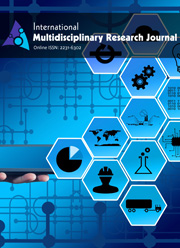Enhance Features in URDU.KON-TB
DOI:
https://doi.org/10.25081/imrj.2019.v9.4254Keywords:
URDU.KON-TB, Converted ability, Enhance features and MaltParserAbstract
In this paper, we enhance features are the head & dependent relationship and functional tagset is marked by dependency grammar rules in URDU.KON-TB for increase the accuracy. The SSP and SSS tagset are using [1]. In this way, we conduct one experiment with six different feature models using MaltParser. First we check converted ability of URDU.KON-TB in domain of dependency parsing through conversion, so that’s why we need to proposed formula and defined rules.
Downloads
Download data is not yet available.
References
[1] Munir, S., Abbas, Q., & Jamil, B. “Dependency Parsing using the URDU. KON-TB Treebank”. International Journal of Computer Applications 2017, 167(12).
[2] Abbas, Q. (2014). Building Computational Resources: The URDU. KON-TB Treebank and the Urdu Parser (Doctoral dissertation).
[3] Ali, W., &Hussain, S. (2010). Urdu dependency parser: a data-driven approach. In Proceedings of Conference on Language and Technology (CLT10), SNLP, Lahore, Pakistan.
[4] Ali, W, (2010). Data-Driven Dependency Parsing for Urdu, MS (MPhil), Computer Sciences thesis, Department of Computer Sciences, National University of Computer and Emerging (NUCES), Lahore, Pakistan.
[5] J. Nivre, Inductive Dependency Parsing, Springer, 2006.
[6] M. Marcus, B. Santorini, and M.A. Marcinkiewicz, "Building a large annotated corpus of English: The Penn Treebank", Computational Linguistics 1993.
[7] Nivre, J., Hall, J., Nilsson, J., Chanev, A., Eryigit, G., Kübler, S., ... &Marsi, E. (2007). MaltParser: A language-independent system for data-driven dependency parsing. Natural Language Engineering, 13(02), 95-135.
[2] Abbas, Q. (2014). Building Computational Resources: The URDU. KON-TB Treebank and the Urdu Parser (Doctoral dissertation).
[3] Ali, W., &Hussain, S. (2010). Urdu dependency parser: a data-driven approach. In Proceedings of Conference on Language and Technology (CLT10), SNLP, Lahore, Pakistan.
[4] Ali, W, (2010). Data-Driven Dependency Parsing for Urdu, MS (MPhil), Computer Sciences thesis, Department of Computer Sciences, National University of Computer and Emerging (NUCES), Lahore, Pakistan.
[5] J. Nivre, Inductive Dependency Parsing, Springer, 2006.
[6] M. Marcus, B. Santorini, and M.A. Marcinkiewicz, "Building a large annotated corpus of English: The Penn Treebank", Computational Linguistics 1993.
[7] Nivre, J., Hall, J., Nilsson, J., Chanev, A., Eryigit, G., Kübler, S., ... &Marsi, E. (2007). MaltParser: A language-independent system for data-driven dependency parsing. Natural Language Engineering, 13(02), 95-135.
How to Cite
Munir, S. “Enhance Features in URDU.KON-TB”. International Multidisciplinary Research Journal, vol. 9, Mar. 2019, pp. 01-03, doi:10.25081/imrj.2019.v9.4254.
Issue
Section
Research Articles






 .
.